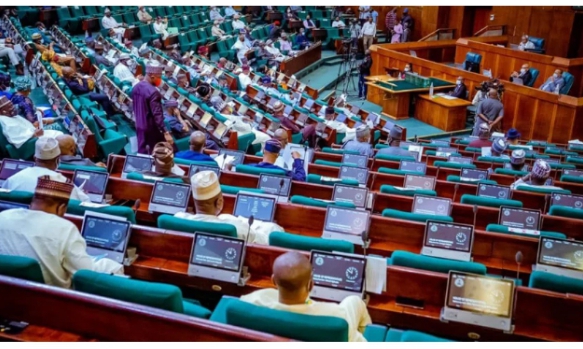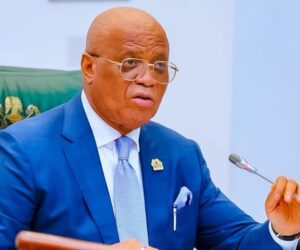1
Oscar Okhifo
The House of Representatives has commenced moves to amend the Economic and Financial Crimes Commission (Establishment) Act, 2004, in a bid to strengthen the Commission’s capacity to tackle emerging financial crimes, especially those involving cybercrimes and cryptocurrency manipulation.
The bill, titled “A Bill for an Act to Amend the Economic and Financial Crimes Commission (Establishment) Act, 2004 and for Related Matters,” was sponsored by Hon. Yusuf Adamu Gagdi (APC–Plateau) and passed for second reading during plenary on Thursday.
Gagdi, while leading debate on the general principles of the bill, explained that the EFCC Act, enacted over two decades ago, was tailored to address conventional corruption and financial offences but is now outdated in the face of fast-evolving digital and virtual financial crimes.
He said the amendment seeks to empower the EFCC with additional legal authority to investigate and prosecute crimes committed through emerging financial technologies, including cyber fraud, cryptocurrency market manipulation, illicit financial flows, and money laundering through digital and real estate platforms.
“The EFCC Act was passed in 2004, when cybercrime and cryptocurrency-related offences were virtually unknown in Nigeria.
” The world has changed drastically since then, and our laws must evolve with it. This bill will empower the EFCC to effectively combat the new wave of financial crimes threatening our economy and national security,” Gagdi stated.
The lawmaker added that the bill would also strengthen the EFCC’s institutional independence by reducing political interference in its operations. Specifically, the amendment proposes that the removal of the EFCC Chairman should no longer be at the sole discretion of the President but should require a two-thirds majority approval by both chambers of the National Assembly.
Several lawmakers who contributed to the debate, including Hon. Benjamin Kalu (APC–Abia), Hon. Olumide Osoba (APC–Ogun), and Hon. Julius Ihonvbere (APC–Edo), threw their weight behind the bill, describing it as timely and necessary to address the realities of modern financial crime.
They noted that cybercriminals, popularly known as “Yahoo Boys,” now use sophisticated digital networks and virtual assets to conceal illicit transactions, while cryptocurrency has become a major channel for money laundering and capital flight from Nigeria.
The bill also aims to promote accountability, efficiency, and transparency within the EFCC by tightening internal oversight and performance monitoring mechanisms. Lawmakers agreed that such measures would restore public confidence in the Commission’s work and enhance its ability to collaborate with international partners on cross-border financial crime investigations.
In a related development, the House has constituted an ad-hoc committee to review the economic, regulatory, and security implications of cryptocurrency and Point-of-Sale (POS) operations across the country.
The committee is expected to interface with stakeholders, including the Central Bank of Nigeria (CBN), Securities and Exchange Commission (SEC), Nigerian Financial Intelligence Unit (NFIU), and the EFCC, to develop a comprehensive framework for digital finance regulation.
Hon. Gagdi explained that the proliferation of unregulated crypto and POS businesses has exposed Nigeria’s financial system to risks such as terrorism financing, money laundering, fraud, and revenue leakages.
“This bill complements our broader efforts to ensure that while Nigeria embraces the benefits of fintech innovation, we also protect our citizens and economy from the associated risks,” he added.
The Deputy Speaker, Hon. Benjamin Kalu, who presided over the session, commended the sponsor for the initiative and stressed the importance of aligning Nigeria’s financial crime laws with global best practices.
After extensive debate, the bill was referred to the House Committee on Financial Crimes for further legislative work, including public hearings and stakeholder engagement.
If eventually passed into law, the amendment will redefine the EFCC’s operational scope, granting it expanded powers to combat cybercrimes, digital fraud, and cryptocurrency manipulation, while reinforcing its independence and institutional integrity.
The proposed law is also expected to enhance Nigeria’s compliance with international standards on anti-money laundering (AML) and counter-terrorism financing (CTF), and strengthen the country’s reputation in global financial governance.








